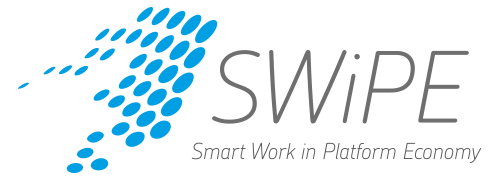SWiPE researchers Laura Seppänen, Mervi Hasu, Sari Käpykangas and Seppo Poutanen have researched platform work’s mechanisms and effects from a sustainable development’s perspective. Work through digital platforms is constantly growing and offering new opportunities. Service providers and buyers meet flexibly and scalably, creating new economic efficiency. At the same time, the platform work may increase the uncertainty of employees and risks.
In their study, SWiPE researchers have observed platform work’s sustainability from the point of view of workers’ resources in a situation, where there is a sudden change in the organisation of work, particularly happening on the behalf of the company. The aim has been to increase understanding of the often invisible factors of the platform work.
In the study, a food courier service company has been used as an example, where the work is done by order and is of a routine nature. This work is characterised by the fact that employees are not included in the range of fringe benefits, the information between work offerers and receivers is asymmetric and the providing and follow-up of work is directed by different algorithms. The distinctive feature of this type of work is that it is often easy to replace workers and it is fed by the oversupply of the gig workers.
The survey was based on interviews with three people in the food courier service. The subject of the review was in particular the new work shift system of the platform and its effects on gig workers.
Based on the analysis of researchers, food couriers who do gig work were guided by freedom and flexibility, and also by getting the desired shifts. Flexibility brought the opportunity to organize work shifts with other gig workers.
The new work shift system was perceived as unfair from the point of view of the distribution and income generation of work shifts based on algorithms. The study found that the ability of the platform companies to modify contracts unilaterally increased the insecurity of the situation of the work receivers. The lack of contractual and regulatory resources was only discovered when there were none. The algorithms provided working shifts unfairly from the point of view of employees.
Despite weak resources and the perceived injustice, many platform companies are growing and attracting workers. The study found that this was due to the fact that the platform work offers freedom and flexibility. In the example company, a good reputation as a work place also increased the attractiveness of the company.
Although a lot of challenges lie in the platform work, it also offers great opportunities. The SWiPE researchers showed that the platforms should also be subject to some degree of employer obligations and a managerial control in order to increase the sense of fairness in the platform work. The researchers see that the organisation of the platform work presents an opportunity to create a whole new and better system.
Summary is based on article: Seppänen, L., Hasu, M., Käpykangas, S., & Poutanen, S. (2018, in press). On-demand work in platform economy: implications for sustainable development. Paper to be presented at the 20th Congres of International Ergonomics Association, Special Session ”Work, Organizational Design and Sustainable Development”. Florence, Italy, August 2018. Springer.
